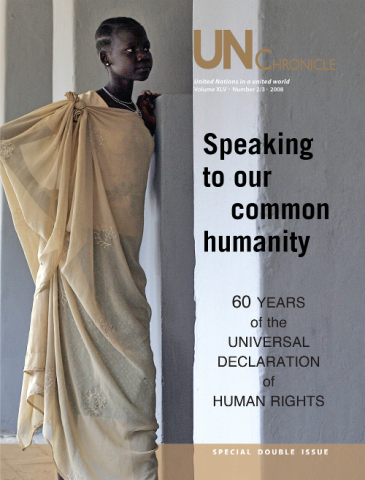

Saving Succeeding Generations
Coinciding with the sixty-third anniversary of the signing of the United Nations Charter, an engaging and educative panel discussion on genocide prevention, with its theme titled Saving Succeeding Generations, was held on 26 June 2008 at UN Headquarters, in collaboration with the Outreach Division of the UN Department of Public Information and the United Nations University.
Rape as a War Crime
Concerned over the security of women and girls in situations of armed conflict, United States Secretary of State Condoleezza Rice stated that rape was a crime that could never be condoned; yet, women and girls around the world had been subjected to widespread and deliberate acts of sexual violence.
The Case for State Intervention
In India, the problems of chronic hunger and malnutrition persist on a massive scale. The prevalence of malnutrition is one of the highest in the world, higher than in some very poor countries of sub-Saharan Africa. According to the 2007 Progress for Children Statistical Review by the United Nations Children's Fund, the proportion of underweight children below the age of five -- an indication of malnutrition -- was 28 per cent in sub-Saharan Africa and 42 per cent in South Asia (43 per cent in India).
Where Food And Energy Compete
Since 2007, global food and energy prices have been increasing steeply, hitting economies reliant on energy and food imports with great force like a silent tsunami. Rising food costs have led to social unrest in some 30 countries. Food and energy security is more closely connected with political stability than ever before. How to balance food security and energy needs is becoming a burning topic in the international community.
The United Nations Must Manage a Global Food Reserve
More than half of the world's 6 billion people eat rice as their staple food. Global rice prices have been rising since early 2003. Moderate increases of 9 per cent in 2006 and 17 per cent in 2007 were recorded, but since the beginning of 2008 international rice prices have shown a steep upward trend, reflecting a limited supply available for purchase.
An Era of Unprecedented Opportunity?
The world is experiencing a dramatic rise in food prices. It began gradually in 2006 and has now escalated into a massive surge. It has caused hunger, protests, riots and even fears for international security. Low-Income Food-Deficit Countries have been hardest hit but the problem is global. Reports of the impact of dearer food on the poor in many developing countries have led to calls for international action to reverse the slide towards increasing poverty and malnutrition.
Biofuels Are No Villain
Food security has always been at the top of my agenda. Upon taking office, my government launched a major domestic programme aimed at eliminating -- not just alleviating -- hunger at home. In 2003, the pioneering Zero Hunger programme has allowed millions of extremely poor Brazilians to have three square meals a day. Its success has encouraged me to believe that similar goals can be achieved at the global level, where millions fall victim to hunger every year.
Bailing Out Humankind From Its Social Insensitivity
A host of world leaders met at UN Headquarters in New York on 12 and 13 November 2008 for an inter-religious and inter-cultural dialogue on a Culture of Peace, at the initiative of King Abdullah bin Abdul-Aziz Al Saud of Saudi Arabia.
The Spectre of the Khmer Rouge over Cambodia
After 27 years of international amnesia over bringing the Khmer Rouge to justice, and following six years of intense negotiations between the United Nations and the Government of Cambodia, the Khmer Rouge tribunal, officially known as the Extraordinary Chambers in the Courts of Cambodia (ECCC), was established in 2006. The tribunal is a UN-assisted national court, with international participation of prosecutors and judges.
Flaws in the Financial System: Socializing Risk, Privatizing Profit
On 30 October 2008, six eminent economists and sociologists at an Interactive Panel on the Global Financial Crisis, convened at UN Headquarters by the President of the sixty-third General Assembly session, Miguel d'Escoto Brockmann, spoke of the unfolding financial crisis and its macroeconomic and social impacts.
